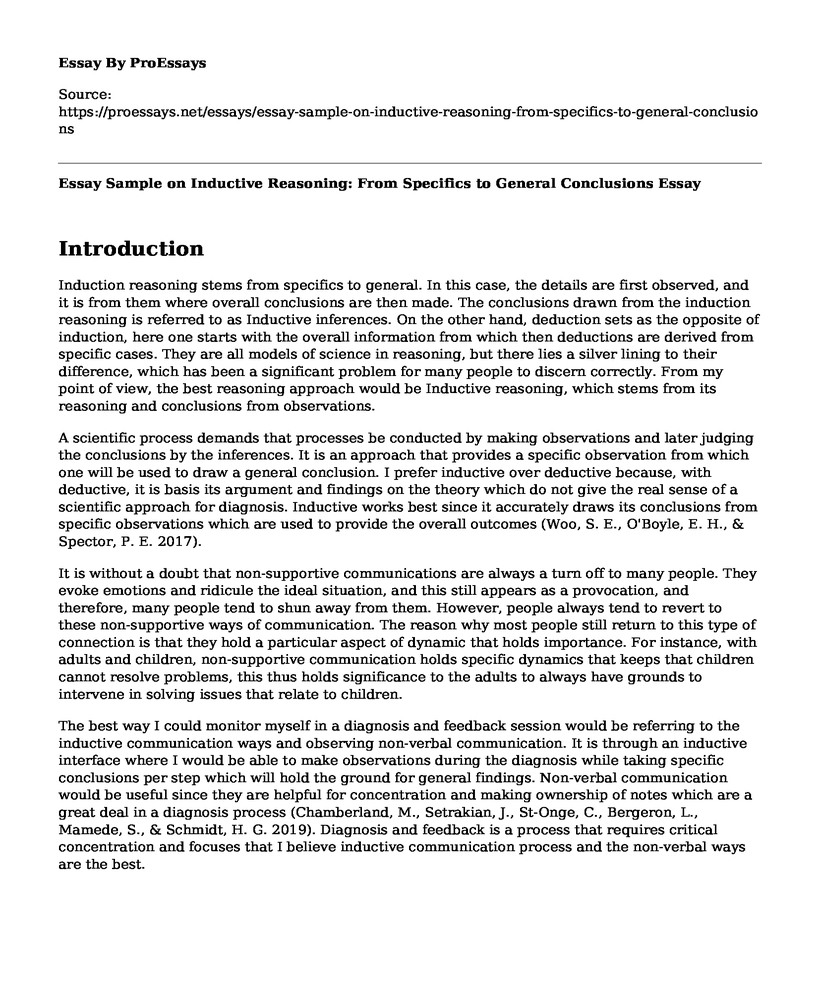Introduction
Induction reasoning stems from specifics to general. In this case, the details are first observed, and it is from them where overall conclusions are then made. The conclusions drawn from the induction reasoning is referred to as Inductive inferences. On the other hand, deduction sets as the opposite of induction, here one starts with the overall information from which then deductions are derived from specific cases. They are all models of science in reasoning, but there lies a silver lining to their difference, which has been a significant problem for many people to discern correctly. From my point of view, the best reasoning approach would be Inductive reasoning, which stems from its reasoning and conclusions from observations.
A scientific process demands that processes be conducted by making observations and later judging the conclusions by the inferences. It is an approach that provides a specific observation from which one will be used to draw a general conclusion. I prefer inductive over deductive because, with deductive, it is basis its argument and findings on the theory which do not give the real sense of a scientific approach for diagnosis. Inductive works best since it accurately draws its conclusions from specific observations which are used to provide the overall outcomes (Woo, S. E., O'Boyle, E. H., & Spector, P. E. 2017).
It is without a doubt that non-supportive communications are always a turn off to many people. They evoke emotions and ridicule the ideal situation, and this still appears as a provocation, and therefore, many people tend to shun away from them. However, people always tend to revert to these non-supportive ways of communication. The reason why most people still return to this type of connection is that they hold a particular aspect of dynamic that holds importance. For instance, with adults and children, non-supportive communication holds specific dynamics that keeps that children cannot resolve problems, this thus holds significance to the adults to always have grounds to intervene in solving issues that relate to children.
The best way I could monitor myself in a diagnosis and feedback session would be referring to the inductive communication ways and observing non-verbal communication. It is through an inductive interface where I would be able to make observations during the diagnosis while taking specific conclusions per step which will hold the ground for general findings. Non-verbal communication would be useful since they are helpful for concentration and making ownership of notes which are a great deal in a diagnosis process (Chamberland, M., Setrakian, J., St-Onge, C., Bergeron, L., Mamede, S., & Schmidt, H. G. 2019). Diagnosis and feedback is a process that requires critical concentration and focuses that I believe inductive communication process and the non-verbal ways are the best.
Conclusion
Inductive and deductive are communication ways that have been confusing over time in the process of diagnosis and feedback. Diagnosis and feedback is a scientific process that requires that specific measures be observed for better conclusions. Thee inferences that are so involved in the process are only best reached at if the inductive module is applied. Many people consider non-supportive ways of communication to be provocative and not suitable for communications. It is a method that has been found not proper in communication, although many people still revert to them. Although they are considered as provocative, they can also be used in resolving conflicts, especially with children where the adults find it to engage. Monitoring and taking an interest in a diagnosis and feedback process is necessary since it helps set those observing in the right state for better focus on the observations made and the inferences in the study.
References
Chamberland, M., Setrakian, J., St-Onge, C., Bergeron, L., Mamede, S., & Schmidt, H. G. (2019). Does providing the correct diagnosis as feedback after self-explanation improve medical students diagnostic performance?. BMC medical education, 19(1), 194.
Woo, S. E., O'Boyle, E. H., & Spector, P. E. (2017). Best practices in developing, conducting, and evaluating inductive research.
Cite this page
Essay Sample on Inductive Reasoning: From Specifics to General Conclusions. (2023, Jan 31). Retrieved from https://proessays.net/essays/essay-sample-on-inductive-reasoning-from-specifics-to-general-conclusions
If you are the original author of this essay and no longer wish to have it published on the ProEssays website, please click below to request its removal:
- Geography Essay Example: An Overview of the Australia
- Essay Example on Environment History
- The Dominican Republic - Research Paper
- Research Paper on United Kingdom Country Profile
- Health Effect of Radiation Essay
- Essay Example on Force: The Key to Electric Power Generation
- Paper Example on Employee Exposure to Methyl n-Amyl Ketone: An Evaluation







